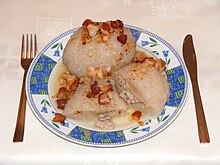Pyzy
Under Pyzy is understood in the narrow sense potato dumplings with a specific meat filling, a traditional dish of Wielkopolska cuisine .
At the same time, in Polish the expression pyzy (singular: pyza ) can generally stand for all round-shaped dumplings and dumplings. These, in turn, fall under the term Kluski (singular: kluska ), which in Polish refers to all dumpling and noodle-like dough products that are not dumplings.
- Pyzy , Pyzy nadziewane or Pyzy z mięsem - "Pyzy", " Stuffed Pyzy" or "Meat Pyzy"; Ball-shaped potato-flour dumplings with a filling of minced beef. They are prepared from raw, grated potatoes; in addition to spices and steamed onions, mushrooms can also be added to the filling. Pyzy are often served with leftover bacon cubes, sour milk and salad are often served with it. Pyzy are related to the Kroppkakor of Swedish cuisine and the Cepelinai of Lithuanian cuisine . In northern Poland there is a regional variant called Kartacze ("Kartätschen").
Regionally and nationally, however, other types of dumplings are also known in Poland as Pyzy, especially:
- Pyzy drożdżowe or Pyzy wielkopolskie - "Yeast Pyzy" or "Wielkopolska Pyzy"; Yeast dumplings cooked in steam with the help of a net. The common name for this is usually Pampuchy or Kluski na parze .
- Pyzy ziemniaczane - "Potato Pyzy"; Potato dumplings made from raw or boiled potatoes without a filling. They are also called Kluski ziemniaczane .
Pyzy in the broader sense are almost always a side dish, mostly with meat and mushroom dishes.
See also
literature
- Robert Strybel, Maria Strybel: Polish Heritage Cookery . Hippocrene Books, New York NY 1993, ISBN 0-7818-0069-2 .
